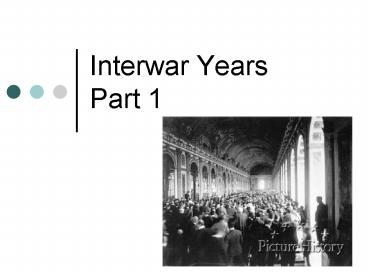Interwar Years Part 1 - PowerPoint PPT Presentation
1 / 14
Title:
Interwar Years Part 1
Description:
The Peace of Paris. After months of difficult negotiations, a settlement was ... The Paris peace settlement left Germany resentful but potentially powerful. ... – PowerPoint PPT presentation
Number of Views:79
Avg rating:3.0/5.0
Title: Interwar Years Part 1
1
Interwar YearsPart 1
2
The Peace Conference
- Participants
- Georges Clemenceau (France)
- David Lloyd George (Britain)
- Woodrow Wilson (U.S.)
- Vittorio Orlando (Italy)
3
The Peace of Paris
- After months of difficult negotiations, a
settlement was reached. - Five treaties made up the Peace of Paris
- One each with Germany, Austria, Hungary,
Bulgaria, and Turkey. - Of the 5, the Treaty of Versailles, which Germany
signed on June 28, 1919, was the most
significant. - France regained Alsace and Lorraine.
- The German Rhineland was demilitarized and
occupied by Allied troops for 15 years.
4
Poland
Jozef Pilsudski
- Of all the issues under debate at Versailles the
one surrounding the fate of Poland was to be the
most intense. - In 1792, the old Polish state was dismembered by
the three empires of Prussia, Austria and Russia.
- It ceased to exist, and apart from a brief return
under Napoleon as the grand duchy of Warsaw, it
did not reappear until 1919. - The creation of a new power in northern Europe
had many supporters. A new Poland would, and
indeed did, act as a buffer zone between
"western" Europe and the new and somewhat feared
Soviet Union.
5
The Peace of Paris
- The treaty also gave part of Prussia to Poland
along with a corridor to the Baltic Sea. - The Germans would never resign themselves to this
loss of territory that separated East Prussia
from the rest of Germany. - To strip Germany of any offensive capability
- The settlement abolished the German general staff
and forbade military conscription in Germany. - The German army was limited to a hundred thousand
volunteers and deprived of heavy artillery,
tanks, and warplanes. - The German navy was limited to a token force,
which did not include submarines.
6
(No Transcript)
7
(No Transcript)
8
The Peace of Paris
- A reparations clause assigned Germany the guilt
for the war and ordered it to pay a debt that
would have taken generations to pay. - The Austrian-Hungarian Empire was broken apart
- Austria was reduced to only 12 percent of its
prewar size. - Hungary lost 75 percent of its land. Serbia
joined with part of Hungary to become Yugoslavia.
Czechoslovakia was formed. Hungary became a
separate country. - The Ottoman Empire was broken apart, setting up a
multitude of problems in the Middle East.
9
Treaty of VersaillesAssessment and Problems
- The Germans unanimously denounced the Treaty of
Versailles - In their minds the war had ended not in German
defeat but in a stalemate. - They had thought the armistice would lead to a
negotiated settlement among equals and based on
Wilsons 14 points. - Instead they were barred from participating in
the negotiations. - The resulting treaty was vindictive and designed
to keep Germany economically and militarily weak.
10
Treaty of VersaillesAssessment and Problems
- But, the new German Republic had no choice but to
sign the treaty. - What is most significant about the treaty is that
it did not solve the German problem. - German was left weak but unbrokenits industrial
and military power was only temporarily contained
and its nationalistic fervor was only fueled by
the unjust treaty. - Also, the responsibility for enforcing the treaty
rested primarily with France. - The Paris peace settlement left Germany resentful
but potentially powerful.
11
Rise of Fascism in EuropePostwar Unrest
- At the Peace of Paris, the Allied powers had
attempted to force democracy throughout Europe. - Yet within two decades, in Spain, Portugal,
Italy, Germany, and in all the newly created
states of central and eastern Europe except
Czechoslovakia, democracy collapsed, and various
forms of authoritarian government emerged. - The defeat of democracy and the surge of
authoritarianism was best seen in the triumph of
totalitarian fascist movements in Italy and
Germany.
12
Mussolini and Italy
- Although Italy had been on the winning side in
World War I, it resembled a defeated nation. - Food shortages, rising prices, massive
unemployment, and violent strikes created a
climate of crisis. - Adding to the unrest was the national outrage at
the terms of the peace settlement. - Italians felt that they had been denied the
fruits of victory because they were not given
land that they were promised by the Allied forces
when Italy entered the war on their side. - They blamed their government for the mutilated
victory
13
Mussolini and Italy
- A supreme opportunist rather than an ideologist,
Benito Mussolini exploited the unrest in postwar
Italy in order to capture control of the state in
1921 and bring his Fascist party to power. - Many Italians viewed Mussolini as the man who
would take the territory due Italy and win
Italys rightful place in international affairs.
14
Depression of 1930
- Just as most of Europe was beginning to recover
economically from World War I, a worldwide
depression hit in 1930 and became the worst
depression of the 20th century. - The United States emerged from WWI as the
dominant economic power and Europe had grown
dependant on U.S. investments. When the Great
Depression started in the U.S. in 1929, it
quickly spread to Europe. - It would be the worst depression of the
industrial age, comparable to the depression of
the 1840s, which had led to the revolutions of
1948. - The Depression of 1930 also led to political
unrest.































